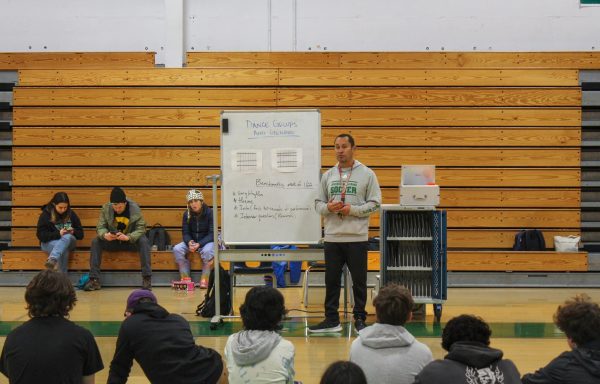Differing parenting styles correlate to children’s mental health

Parents show authority by yelling towards their children, setting a high level of discipline in their household, a more authoritarian method.
A student’s mental health can deteriorate for many reasons; from the pressures of school, to social anxiety, to issues in their home lives. Some students, unbeknownst to their peers, live amongst pressing family dynamics, such as parents setting unrealistically high standards for their children. The methods parents use to direct their children throughout life have an immense impact on the child, oftentimes in unintended ways.
Psychologist, Dayna Moss, has a private practice in Corte Madera called the Authentica Center, offers individual therapy for teens ages five to 18, as well as parent consultation. She believes that the “at home” dynamic oftentimes intensely impacts the way a child chooses to live their life.
“Parenting is one of many factors that can influence a child’s mental health, and there’s a spectrum of different parenting styles,” Moss said.
According to Moss, there are three main parenting styles. On the extreme end is the ‘authoritarian’ method, practicing a strict and harshly pressured technique. On the other end of the spectrum is the ‘permissive’ parenting style, a more laid-back approach. In the midground is the ‘authoritative manner,’ which is a balance of both styles.
All of these methods can be seen in most family dynamics; the most common being the authoritative manner. Moss has observed that the authoritarian style can cause children to feel unseen while the permissive style can provide too much freedom, causing children to take advantage of the lack of rules.
According to an article called ‘Correlating Parenting Styles With Child Behavior’ from the National Library of Medicine on parenting and child behavior, “Eighty-seven parents [66 percent] studied exhibited authoritative parenting, 33 [25 percent] exhibited permissive parenting, [and] 11 [eight percent] exhibited authoritarian parenting.”
Parents affect their children no matter how they treat them but don’t always fall under a certain parenting category.
“The more the child feels that the parents are engaging them, and the more the child feels seen and heard by their parents, the higher their self esteem, the higher their confidence, the higher their ability to make their own decisions,” Moss said.
Moss claims that authoritative parenting can offer the most engagement without being too demanding on children.
According to Verywellmind’s article “Why Parenting Matters While Raising Children” only 53 percent of parents in America are satisfied with their level of engagement with their child, 46 percent wish they could be doing more.
Sophomore Peter Sanford believes any type of parent involvement with their children creates standards for children to follow and is truly important.
“I think parents can have a huge effect on a kid’s mental health with whether or not they are reciprocating how their kids are doing based on their emotions,” Peter said.
He feels that parents need to show their presence to their children and bond with them on an emotional level in order to feel connected. This connection will leave the child feeling whole, with less desire to rebel.
“Parents have all these experiences and all these resources that they can give to their kids to help them, so if parents are making sure their kids are happy and checking in on them then kids are going to have better mental health,” Peter said.
Sophomore Sarah Conway thinks her parents have well regulated rules, and she has little trouble following them. Sarah’s parents like to be in constant contact with her when she’s out with friends, which can feel difficult at times. Luckily, her family’s open communication allows her to voice when there’s something she disagrees with.
“My parents do have a lot of effect on me. I’d say I listen to what they say within reason, but if I don’t think something is fair then I argue it,” Sarah said.
AWHS wellness coordinator Katrina Southard feels there isn’t always an immediate response in the parent-child dynamic, and that not every situation will affect a student.
“I don’t know if there’s any equation that, if your parents are this way, then your child will react that way. I think it has a lot to do with the personalities of all the different people involved,” Southard said.
Parents aim to help their children strive, and Southard does not feel there is a correct or incorrect way to parent; each child requires different attention, and each parent has their own methods.
“I think everyone would be parenting [the “best” way] if they knew what the best way was,” Southard said.
YouGovg.com states that 82 percent of adults say it is more favorable for parents to be strict, including 78 percent who say “fairly strict is best.” Only 13 percent believe it’s better if parents aren’t so hard on their children (2015).
While everyone has contrasting opinions based on their own experience with parenting methods, parenting approaches do shape who children become.
Your donation will support the student journalists of Archie Williams High School. Your contribution will allow us to purchase equipment and cover our annual website hosting costs. Each donation will receive a magazine subscription for a year (6 copies a year), and become a part of the important work our publication is doing.
$35 -- Subscription to the magazine
$50 -- Silver Sponsorship
$75 -- Gold Sponsorship
$100 -- Platinum Sponsorship

Kyra is a senior, in her third year of journalism. She loves pickles, listening to music, and stargazing. You can find her driving around with her bag...

Ava is a senior, starting her first year in journalism. She loves ear piercings, super spicy sushi from restaurants in San Francisco and roaming the aisles...











